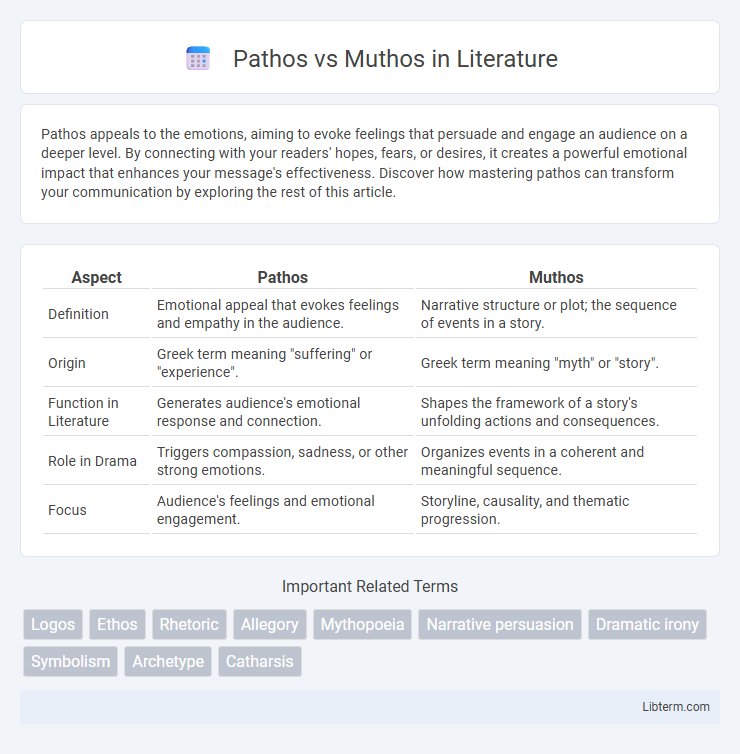Pathos appeals to the emotions, aiming to evoke feelings that persuade and engage an audience on a deeper level. By connecting with your readers' hopes, fears, or desires, it creates a powerful emotional impact that enhances your message's effectiveness. Discover how mastering pathos can transform your communication by exploring the rest of this article.
Table of Comparison
| Aspect | Pathos | Muthos |
|---|---|---|
| Definition | Emotional appeal that evokes feelings and empathy in the audience. | Narrative structure or plot; the sequence of events in a story. |
| Origin | Greek term meaning "suffering" or "experience". | Greek term meaning "myth" or "story". |
| Function in Literature | Generates audience's emotional response and connection. | Shapes the framework of a story's unfolding actions and consequences. |
| Role in Drama | Triggers compassion, sadness, or other strong emotions. | Organizes events in a coherent and meaningful sequence. |
| Focus | Audience's feelings and emotional engagement. | Storyline, causality, and thematic progression. |
Understanding Pathos and Muthos
Pathos refers to the emotional appeal used to persuade or influence an audience by evoking feelings such as sympathy, anger, or passion. Muthos, rooted in ancient Greek philosophy, denotes the narrative or mythic structure that conveys deeper meanings and cultural truths through storytelling. Understanding the distinction between Pathos and Muthos enhances comprehension of how emotions and narratives shape human experience and communication.
Historical Origins of Pathos and Muthos
Pathos and Muthos both have roots in ancient Greek culture, with Pathos originating from the rhetorical tradition emphasizing emotional appeal to persuade audiences, as seen in Aristotle's "Rhetoric." Muthos, on the other hand, derives from mythological narratives and oral storytelling traditions that explained human experience and cultural values through symbolic tales. These concepts evolved separately but intertwined in ancient Greek literature, shaping the foundation of Western narrative and persuasive techniques.
Pathos: The Power of Emotional Appeal
Pathos harnesses the power of emotional appeal to persuade audiences by tapping into feelings such as empathy, anger, or sadness, making arguments more relatable and compelling. Emotional resonance created through pathos can significantly influence decision-making processes and enhance message retention. Effective use of pathos involves storytelling, vivid imagery, and passionate delivery to evoke strong emotional responses that drive action.
Muthos: Narratives and the Birth of Myth
Muthos represents the foundational narratives that gave rise to myth, embedding cultural values and collective experiences into symbolic stories. These ancient narratives served as a framework for understanding the world, shaping identity through shared myths that transcend mere emotional appeal found in Pathos. Muthos operates as a vehicle for transmitting tradition and meaning, connecting communities across generations through timeless storytelling.
Pathos in Rhetoric and Persuasion
Pathos in rhetoric refers to the emotional appeal used to persuade an audience by eliciting feelings such as pity, fear, or passion, creating a strong connection with the message. It plays a crucial role in persuasion by targeting the audience's emotions to influence attitudes and motivate action, often complementing logos (logic) and ethos (credibility). Skilled rhetoricians leverage pathos through vivid language, storytelling, and evocative imagery to enhance the effectiveness of their arguments.
Muthos in Ancient Storytelling
Muthos in ancient storytelling refers to the structured narrative or myth that conveys essential cultural truths and values through symbolic tales. Unlike Pathos, which appeals to emotions, Muthos emphasizes the cohesive plot and the moral or existential lessons embedded within myths. In classical literature, Muthos functions as a foundational framework for preserving communal identity and explaining the human condition through legendary events and divine interventions.
Pathos vs Muthos: Key Differences
Pathos centers on evoking emotions and appealing to the audience's feelings to persuade or create a connection, while Muthos focuses on storytelling, narrative structure, and the sequence of events in myths or literature. Pathos drives emotional engagement by highlighting human experiences and sentiments, whereas Muthos provides the framework and context that shape meaning through plot and character development. Understanding the distinction clarifies how rhetoric uses emotional appeal versus narrative construction to influence interpretation and response.
The Role of Pathos and Muthos in Literature
Pathos evokes emotional responses that deepen reader engagement, while muthos drives the narrative through structured plot and mythic elements. In literature, pathos connects audiences with characters' feelings, enhancing empathy and moral reflection. Muthos provides a framework of meaning, embedding cultural myths and archetypes that shape the story's thematic foundation.
Modern Applications of Pathos and Muthos
Pathos, the appeal to emotion, plays a crucial role in modern marketing campaigns by influencing consumer behavior through emotional storytelling and persuasive visuals. Muthos, the narrative structure rooted in myth and tradition, remains integral to contemporary film and literature, providing frameworks that resonate with cultural archetypes and universal themes. Both pathos and muthos are essential in crafting compelling messages that engage audiences on emotional and narrative levels, enhancing communication effectiveness across digital media platforms.
Pathos and Muthos: Philosophical Significance
Pathos and Muthos hold significant philosophical implications, where Pathos refers to the emotional appeal that influences human experience and ethical decision-making, while Muthos represents the structured narrative or myth that shapes cultural and existential understanding. Pathos engages the individual's feelings and passions, shaping personal identity and moral values through empathetic resonance. Muthos provides foundational stories that frame collective meaning and guide philosophical inquiry into the nature of reality and human purpose.
Pathos Infographic

 libterm.com
libterm.com